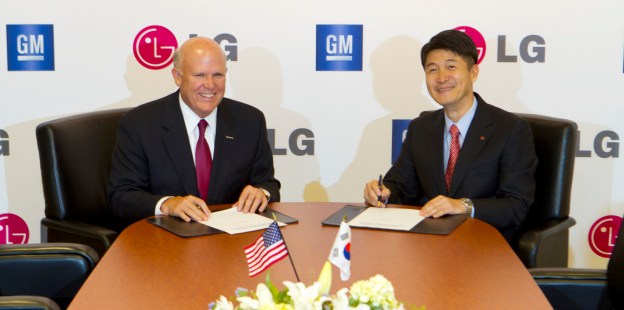
General Motors is teaming up with LG to develop electric cars that go beyond the capabilities of the Chevy Volt, a plug-in hybrid gas and electric vehicle. LG Chem, a subsidiary of LG, supplies the lithium ion batteries that power the Volt and other GM electric prototypes. The new deal will go beyond just batteries. According to the joint announcement yesterday, LG will aid with key components related to vehicle structure, architecture, other automotive solutions.
“Many solutions for tomorrow’s transportation needs may be available more quickly by building on our partnership strategy,” said GM Vice Chairman Steve Girsky. “Consumers benefit by getting the latest fuel-saving technology faster if we work with the best suppliers and we save time and money in the development process.”
With gas prices rising again and fuel economy standards rising to 54.5 miles per gallon by 2025, the idea of moving toward an electric solution is becoming more and more attractive to the big auto makers. Almost every major auto maker has an electric car in development, though the price of these vehicles remains high and their range remains at 100 miles to the charge.
“This is a strategic development for LG and we fully support GM’s goal to lead the industry in the electrification of the automobile,” said Juno Cho, president and CEO of LG Corp.
It is unknown whether this partnership will make any headway toward solving some of the major problems with electric cars, like the capacity of lithium ion batteries, their fast degradation rates, and the amount of time it takes to charge an electric vehicle, which is currently about eight hours for a full charge. Like all electronics, what the electric car really needs is a new type of battery technology to be invented that holds a much bigger charge for longer on a quicker charge. Unfortunately, we haven’t heard any news on that front yet.
Editors' Recommendations
- GM to cut funding for beleaguered driverless startup Cruise, report claims
- GM plans to phase out Apple CarPlay for EVs, go all-in on Android integration
- 2022 Chevy Bolt EV and Bolt EUV: More electric cars to love
- Lucid Motors CEO gives us the details on the 400-mile Air electric car
- Tesla’s new million-mile battery could finally make electric cars affordable

